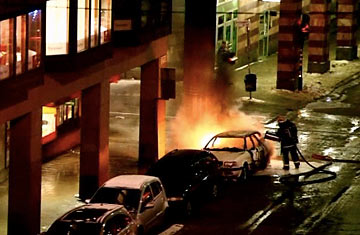
An image taken from video footage shows firefighters battling a car blaze in Stockholm on Dec. 11, 2010
Anna Eriksson, a 36-year-old Stockholm schoolteacher and the epitome of this famously functional city's elegant, prosperous and confident professional middle class, was about to enter a subway station on Sunday when she did something she never imagined doing in her hometown: she hesitated. A day earlier, two explosions shook Stockholm's nearby shopping district in what appears to be the first suicide-terrorism attack in the country's history. Eriksson was unsettled. "We are not used to feeling vulnerable," she explains. "I know things like this happen, but I never thought it could happen here."
This weekend, cozy, comfortable Sweden received a brutal reminder that it is both a participant and a target in the war against terrorism. On Sunday, the country's domestic intelligence service announced that it was treating two explosions — one that killed a presumptive suicide bomber, and a car bomb that injured two people — as "an act of terrorism." Minutes before the detonations, Swedish news agency Tidningarnas Telegrambyra received an e-mail that was also addressed to the police that promised retribution for Sweden's decision to send a 500-strong military contingent to Afghanistan and for its failure to condemn cartoons of the Prophet Muhammad that were drawn by the Swedish artist Lars Vilks.
Authorities refused to comment on press reports naming a 29-year-old, Iraqi-born Swede as the perpetrator, nor is it known if the explosions were the work of a single individual or a terrorist cell. But already the incident has raised an uncomfortable question for a country that prides itself on open democracy: Can Sweden continue to guard civil liberties while meeting 21st century security threats? In the aftermath of 9/11, the U.S. Congress passed the Patriot Act, which many branded an infringement of civil liberties. And Britain, responding to its own terrorism threat, has expanded police powers to undertake spot searches of pedestrians, set up extensive video-surveillance networks and extend the period for which suspects can be detained without charge. Now Sweden, too, may face the dilemma of balancing individual liberty with collective security.
On Sunday, Swedish Prime Minister Fredrik Reinfeldt anticipated this question in a radio interview in which he reminded Swedes that "Sweden is an open society with an open tradition. It's important to remember on a day like this that this is how Sweden is." That may be true, but the country has also undergone profound changes in recent years that have placed new strains on its tradition for consensual, enlightened politics. The country has absorbed large numbers of refugees since the Iraq and Afghanistan wars, boosting the number of Muslim immigrants to about 5% of Sweden's 9.3 million people. The resulting backlash saw the anti-immigrant Sweden Democrats Party shock the country in September's election by winning 20 seats in Parliament. Sweden's self-image as a haven from global upheaval — the country never joined NATO, and remained neutral during WWII — has also been challenged by its participation in the Afghanistan war, revelations that two Swedish citizens committed suicide bombings in Iraq and the conviction of two Swedes last week for planning terrorist attacks in Somalia.
Some commentators have accused the government and security services of naively placing abstract ideals of tolerance above the physical security of its citizens. "As a country, we have had an attitude that this might happen to other countries, but not to us. Discussions are more about how to be politically correct rather than focusing on the problems in order to solve them," terrorism expert Lars Nicander of the Swedish National Defense College tells TIME. "Sweden's strategies so far have been to react to terrorism rather than to prevent it." Nicander adds that the security situation is linked to the problem of Muslim assimilation within Swedish borders. "There's no discussion on the alienation and the social problems people are experiencing, things that can lead to events like this," he says.
That sort of rhetoric scares Swedish civil liberty campaigners like Ola Larsmo, chairman of the country's branch of PEN, the international association of writers. Larsmo spent most of Sunday preparing an op-ed for Dagens Nyheter, a Swedish daily, reminding Swedes that they had faced terrorism before without giving up their cherished ideal: in 1975 four people were killed when part of the Red Army Faction occupied the West German embassy in Stockholm. In 1986 Prime Minister Olaf Palme was shot dead on a Stockholm street, while in 2003 Foreign Minister Anna Lindh was stabbed to death in a department store. "We reacted well to those crises — what some people perceive as Swedish naivety is in fact we guarding our democratic society and not getting sucked into black and white thinking. We need to keep our Swedish heads as cold as possible as we decide how to react to this."
Paraphrasing Franklin Roosevelt, Larsmo also said that "freedom from fear is essential to a functioning democracy; it is not power that corrupts a democracy, it is fear." At the site of the attack on Sunday, Stockholm's shopping promenade was bustling with shoppers making their way over the crunchy snow into the city's glamorous retail outlets; two rosy-cheeked teens in earmuffs and mittens brought cups of steaming hot chocolate to the police officers guarding the attack site with the traditional, jolly Swedish greeting of "Hej Hej!" It was, in short, a typical Stockholm portrait of a friendly, calm and functional society. But in the aftermath of the attacks, no doubt many Swedes are experiencing a very un-Swedish sensation: an undercurrent of unease.
— With reporting by Lotten Sundgren / Stockholm
